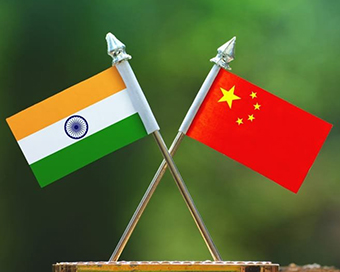Gallery
 PM Modi visit USA
PM Modi visit USA Only the mirror in my washroom and phone gallery see the crazy me : Sara Khan
Only the mirror in my washroom and phone gallery see the crazy me : Sara Khan Karnataka rain fury: Photos of flooded streets, uprooted trees
Karnataka rain fury: Photos of flooded streets, uprooted trees Cannes 2022: Deepika Padukone stuns at the French Riviera in Sabyasachi outfit
Cannes 2022: Deepika Padukone stuns at the French Riviera in Sabyasachi outfit Ranbir Kapoor And Alia Bhatt's Wedding Pics - Sealed With A Kiss
Ranbir Kapoor And Alia Bhatt's Wedding Pics - Sealed With A Kiss Oscars 2022: Every Academy Award Winner
Oscars 2022: Every Academy Award Winner Shane Warne (1969-2022): Australian cricket legend's life in pictures
Shane Warne (1969-2022): Australian cricket legend's life in pictures Photos: What Russia's invasion of Ukraine looks like on the ground
Photos: What Russia's invasion of Ukraine looks like on the ground Lata Mangeshkar (1929-2022): A pictorial tribute to the 'Nightingale of India'
Lata Mangeshkar (1929-2022): A pictorial tribute to the 'Nightingale of India' PM Modi unveils 216-feet tall Statue of Equality in Hyderabad (PHOTOS)
PM Modi unveils 216-feet tall Statue of Equality in Hyderabad (PHOTOS)Hockey India has announced a 54-member core probable squad for the upcoming senior men’s
- Satwik-Chirag return as BAI names 14-strong squad for BWF Sudirman Cup Finals 2025
- Men’s Sr Hockey Nationals to be played in division-based format from April 4
- Mensik denies Djokovic 100th title in Miami final
- KIPG: Son of a vegetable vendor, Bihar’s Jhandu Kumar eyes Worlds, 2028 Paralympics
- Hardik Singh credits hard work and team unity for receiving HI Midfielder of the Year award
China wanted to settle border dispute with India in 2001, says new book Last Updated : 18 Jun 2020 11:40:21 AM IST 
file photo China had sought to settle the border dispute with India by finalising its boundary in Tibet in 2001, but the then Atal Bihari Vajpayee government failed to respond, as per a recent book published by HarperCollins.
Sarosh Zaiwalla, the Indian-origin founder of and senior partner at Zaiwalla & Co., a prominent law firm in London, in his recent memoir, "Honour Bound -- Adventures of an Indian Lawyer in the English Courts", has revealed that China sought to settle its border dispute with India in 2001, but the then Indian government did not respond to the confidential overture made through him.The then Chinese ambassador to Britain, Ma Zhen Gang, had suggested to him a "second-channel" for confidential meetings between the political leaders of the two countries be established "to find a practical resolution at the highest political level in both countries to settle the border dispute," according to Zaiwalla's memoir.Zaiwalla had previously organised a successful second channel high-level dialogue between 10 Downing Street and China over the issues which had arisen related to the handover of Hong Kong.To pursue the matter, an aide-memoire was drafted between the two, the book said. "I gave the note which I had prepared, with the ambassador's input and approval, to Maneka Gandhi, who confirmed to me that she had passed it on to Jaswant Singh (who was then the Indian External Affairs Minister)," Zaiwalla wrote in his book.He went on to reveal: "When I met Jaswant Singh at an event in the Washington Hotel in London a few months later, he said to me airily, 'I have given your note to my department to consider'. Nothing happened.""For China in those days," Zaiwalla recorded, "The focus was on economic development and not military might."He added: "I did believe China was genuinely keen on sorting out the border dispute with India..."Zaiwalla recalled that Ambassador Ma told him: "China wants the original border of Tibet to be the border with India. The line drawn by the British Raj as the border between Tibet and India cannot be considered the proper border. We are not claiming any Indian territory but what is Tibet should come back to us."The lawyer recorded in his book: "I told the Chinese ambassador that for India to part with any territory would not be acceptable for the Indian people...I also brought to his attention the fact that at the time the border, as drawn by (Henry) McMahon (Foreign Secretary of British India), was agreed by Tibet and India, Tibet had a government. Therefore, there had been a legal and binding acceptance by Tibet and India of the location of the border. This, in turn, would be binding on China. In my conversations with him, the ambassador accepted that all these points could be discussed."He further noted: "According to a 1959 diplomatic note signed by Zhou Enlai, the former Chinese Prime Minister, China does recognise a Line of Actual Control that closely approximates to most of the McMahon Line along the eastern side of its border with India.""In working with the Chinese ambassador to the United Kingdom in 2001 to create a confidential backchannel between China and India, I became highly familiar with this border dispute. Both sides should seek to settle this matter in bilateral talks without the need for India to cede any Indian territory. This should be possible," the book said.IANS New Delhi/Beijing For Latest Updates Please-
Join us on
Follow us on








172.31.16.186







